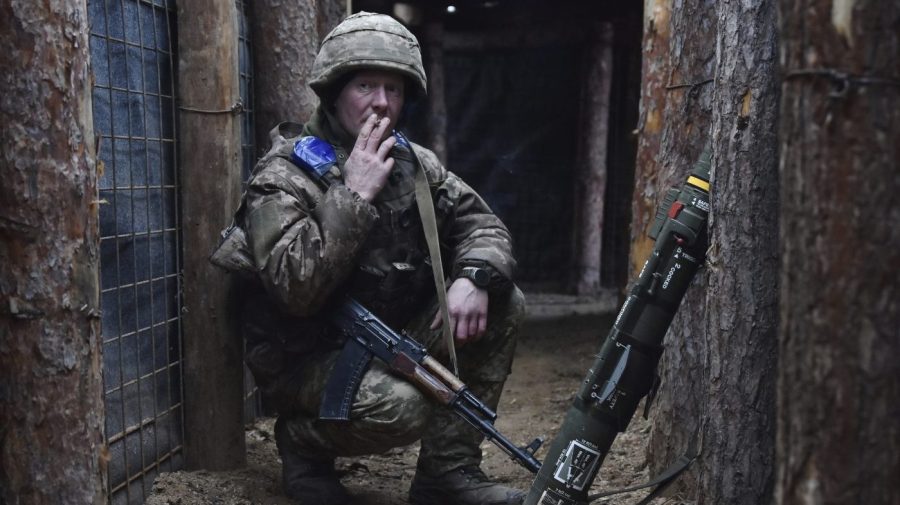
Residents of Kyiv are panicking! At the rate that Vladimir Putin’s unstoppable military juggernaut is capturing Ukrainian territory, their city will fall into Russian hands in only 92 years. Just in time to celebrate the Russian dictator’s 165th birthday!
Although this paragraph may strike one as silly, that’s because it’s a reductio ad absurdum, a reduction to the absurd of a particular narrative favored by the Kremlin and its fellow travelers in the West. According to this view, Russia’s mighty armed forces are seizing huge swaths of Ukrainian territory, while the poor Ukrainians, though outgunned and outmanned, are desperately, even heroically, resisting — but to no avail. The Russians will keep on coming until they overrun Ukraine. Therefore, Ukraine and its allies should agree to any kind of peace deal today, because the future can only get worse.
This narrative is just that — an opinion with little grounding in actual facts. The amazing thing about it is not that the Kremlin promotes it, but that many Western analysts continue to adhere to it. They should know better, if only because all it takes to see that this narrative is silly is a rudimentary knowledge of arithmetic.
According to one Ukrainian analyst’s estimate, Russia captured 2,600 square kilometers of Ukrainian territory in 2024. (The U.S.-based Institute for the Study of War places the number at 4,168.) Ukraine’s left bank — the area east of the Dnipro River — constitutes 240,000 square kilometers. Assume that all of Kyiv is on the left bank and then divide 240,000 by 2,600 to get 92, the number of years it would take for Russia to capture left-bank Ukraine at its current rate. (Alternatively, divide 240,000 by 4,168 to get 58 years.)
So, yes, Russia is making incremental advances, but no, those gains don’t amount to a blitzkrieg. Contrast these numbers with the widespread images of Russia as an invincible war machine and conclude that something must be amiss with this narrative.
But the facts are even more depressing for the Putin gang. In 2024 alone, Russia suffered 427,000 casualties, including dead and wounded. Divide that number by 2,600 — the amount of Ukrainian territory captured by Russia in 2024 — and you get 164, the number of Russian casualties per captured square kilometer. Multiply 164 by 240,000, Ukraine’s territory east of the Dnipro, and you get 39 million — the number of soldiers Russia would lose in 92 years of projected fighting. (The same operations using Institute for the Study of War estimates equals 25 million casualties.) Even Putin would conclude that these numbers might put a damper on his birthday festivities.
Do the numbers suggest that Russia is invincible? Hardly, especially as Ukraine has been able to impose such enormous losses while “desperately” waiting for assistance from a West that dithers with deliveries as a matter of policy.
Do the numbers suggest that Russia will win? Only if one considers sluggish territorial gains achieved with unsustainably high human losses and a collapsing economy a victory. At best, it’s a draw. At worst, one could make the case that, given the imbalance of economic, material and human resources, Ukraine’s ability to achieve a draw actually amounts to a victory.
Imagine that the U.S. invades Mexico, captures a few provinces in its initial advance, loses about half of the initially captured territory, and then suffers 427,000 casualties in just one year while making micro-advances. No American would call that a success, while all Mexicans would be rejoicing for having stopped Yankee imperialism.
Naturally, this analysis is incomplete. Ukraine has also lost thousands of soldiers and civilians; its cities and infrastructure have been devastated; and Russia continues to occupy about one-fifth of its territory. But here, too, given Russia’s advantages in virtually everything, these losses translate into either a draw or a modest victory for Kyiv.
It follows that Ukraine and its allies should not agree to any kind of peace deal today, because the future can only get worse for Russia. Why, then, do Western analysts continue to believe in the Kremlin’s narrative and repeat such self-evident nonsense?
Some are simply Moscow’s fellow travelers — Hungarian Prime Minister Viktor Orbán and Slovak Prime Minister Robert Fico come to mind. They feign concern for Ukraine’s suffering, but, like the Freedom Party of Austria, the Alternative for Germany and some MAGA Republicans, they are Putin’s ideological and political allies. Unfortunately, Elon Musk, who does know how to do arithmetic, falls into this camp as well.
Others, like some neo-realist scholars, are wedded to their assumptions and theories, regardless of the facts. Having built their careers on those ideas, they believe they can’t abandon them without losing face. That’s a natural impulse among all academics, even though there’s nothing like a well-timed mea culpa to reinforce one’s reputation as a wise seer who has the guts to admit to being wrong.
Still others, perhaps the majority, are soft on the Kremlin and its narrative simply because the Biden administration, which they hate, pursued a hard-ish line toward Putin. Since the enemy of my enemy must be my friend, they objectively side with Russia, even as it violates everything they claim to stand for.
The bad news is that even people with the intellectual wherewithal to see through Putin’s propaganda can embrace it. The good news is that numbers don’t lie and that facts usually get the upper hand over half-baked narratives — perhaps not immediately, but eventually.
Alexander J. Motyl is a professor of political science at Rutgers University-Newark. A specialist on Ukraine, Russia and the USSR, and on nationalism, revolutions, empires and theory, he is the author of 10 books of nonfiction, as well as “Imperial Ends: The Decay, Collapse, and Revival of Empires” and “Why Empires Reemerge: Imperial Collapse and Imperial Revival in Comparative Perspective.”












